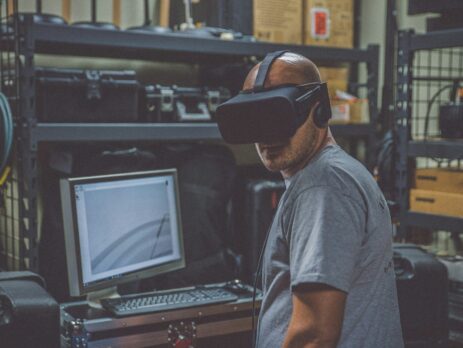Recruitment Redefined: Hiring Strategies for Virtual Reality Developers
The landscape of technology recruitment is evolving rapidly, and nowhere is this more apparent than in the field of virtual reality (VR). As VR technologies continue to advance, the demand for skilled developers who can navigate this complex and immersive field is at an all-time high. This comprehensive guide explores the nuances of recruiting top-tier VR developers, offering insights and strategies to help companies attract, evaluate, and retain the best talent in this burgeoning industry.
Understanding the unique skill sets required for VR development is the first step in refining recruitment strategies. VR developers need a blend of technical prowess in software development, a deep understanding of 3D modeling, and an innovative mindset capable of pushing the boundaries of digital interaction. This multidisciplinary skill requirement makes the hiring process challenging and competitive.
Companies looking to hire VR developers must also consider the cultural fit and the ability to work within teams that are often highly collaborative and project-driven. The dynamic nature of VR projects, which often combine elements of gaming, simulation, and interactive media, requires developers who are not only technically proficient but also creative and adaptable.
Another key aspect of recruiting VR developers is understanding the tools and technologies that are most relevant in the industry today. Familiarity with platforms such as Unity or Unreal Engine is often essential, along with experience in coding languages like C# or C++. Additionally, knowledge of VR hardware such as Oculus Rift, HTC Vive, or other augmented reality (AR) systems can be crucial.
The recruitment process itself needs to be tailored to attract VR talent. This involves not only traditional recruiting methods but also leveraging new platforms and media. Virtual job fairs, online coding challenges, and engaging with potential candidates through VR meetups or conferences can be effective strategies.
Employer branding also plays a significant role in attracting VR developers. Companies that are seen as innovators in VR technology are more likely to attract top talent. Showcasing past projects, company culture, and future VR endeavors in job postings and interviews can make a significant difference.
Once potential candidates are identified, the interview process for VR developers should be meticulously designed to assess both technical skills and creative thinking. Problem-solving tasks that involve real-time coding or debugging VR applications can provide valuable insights into a candidate’s capabilities and approach to VR development.
Retention strategies are equally important. The VR industry is fast-paced and competitive, and retaining top talent can be challenging. Offering continuous learning opportunities, competitive compensation packages, and a clear path for career advancement can help keep VR developers engaged and motivated.
In conclusion, as the VR industry continues to grow, companies must adapt their recruitment strategies to meet the demands of this unique and evolving field. By understanding the specific skills required, leveraging modern recruitment tools, and fostering an innovative company culture, businesses can successfully attract and retain the VR developers who will help shape the future of technology.
What specific skills should be prioritized when hiring VR developers?
When hiring VR developers, companies should prioritize a diverse set of skills that cater to the multifaceted nature of virtual reality development. Technical proficiency in popular VR development platforms like Unity and Unreal Engine is crucial. These platforms are the backbone of most VR content creation, and expertise in them is a must.
Coding skills are equally important, with a strong emphasis on languages such as C# and C++. These languages are commonly used in VR development for creating detailed and interactive environments. Additionally, a good grasp of 3D modeling and computer graphics is essential, as these skills help in designing realistic and engaging virtual worlds.
Problem-solving skills and creativity are also vital. VR development often involves unique challenges that require innovative solutions. Developers must be able to think creatively to overcome these challenges and push the boundaries of what is possible in virtual environments.
Experience with VR hardware, such as Oculus Rift, HTC Vive, and other AR systems, is also beneficial. Understanding the hardware limitations and capabilities can significantly impact the development process and the final product’s effectiveness.
Soft skills should not be overlooked. Effective communication and teamwork are crucial in VR projects, which are typically highly collaborative. The ability to work well in a team and communicate ideas clearly can be just as important as technical abilities.
Attention to detail is critical, especially in a field where small elements can significantly affect the user’s experience. VR developers must ensure that every aspect of the environment is carefully crafted to produce a seamless and immersive experience.
Adaptability is another key skill, given the rapid pace of technological advancements in VR. Developers need to be able to learn and integrate new tools and technologies quickly.
Finally, a passion for VR technology and its potential applications is often a strong indicator of a candidate’s dedication and potential for innovation. Enthusiasm for the field can drive developers to stay on top of trends and continually improve their skills.
By prioritizing these skills, companies can ensure they hire VR developers who are not only technically proficient but also well-rounded and capable of contributing to innovative and successful VR projects.
For more insights on managing a technology-driven workforce, visit Tips for Managing a Remote Workforce.

How can companies effectively assess the technical abilities of VR developer candidates?
Assessing the technical abilities of VR developer candidates is crucial to ensure they can handle the specific demands of VR projects. One effective method is to conduct technical interviews that include practical coding tests. These tests should be designed to reflect real-world problems that developers might face in VR development.
Another approach is to review a candidate’s portfolio of past projects. A portfolio can provide concrete examples of their skills and the complexities they have managed in previous roles. It’s also an opportunity to assess their creativity and problem-solving abilities in a practical context.
Companies might also consider hosting or participating in hackathons or coding challenges specifically focused on VR development. These events can be a great way to see how candidates perform under pressure and in a competitive setting.
Pair programming sessions during interviews can offer insights into a candidate’s thought process and collaboration skills. This approach involves the candidate and an interviewer working together on a coding task, providing a firsthand look at the candidate’s technical expertise and ability to communicate effectively.
Asking candidates to critique a piece of VR software or to suggest improvements for a VR application can also be revealing. This not only shows their technical understanding but also their capacity for critical thinking and innovation.
For roles that require specific technical knowledge, such as expertise in a particular VR platform or programming language, tailored technical quizzes can be useful. These quizzes can assess specific knowledge and the ability to apply it in practical scenarios.
It’s also beneficial to involve current VR developers in the recruitment process. They can provide valuable insights into the technical requirements of the role and help assess the technical skills of the candidates from a practitioner’s perspective.
Additionally, considering candidates’ continuous learning and professional development efforts can be indicative of their commitment to staying updated with the latest technologies and practices in VR development.
Finally, it’s important to ensure that the assessment process is fair and unbiased. Structured interviews and standardized tests can help reduce bias and make the hiring process more equitable.
For more on creating effective tech teams, see Successfully Managing Software Development Teams.
What are the best platforms and tools for recruiting VR talent?
Recruiting top VR talent requires leveraging the right platforms and tools that can connect employers with skilled professionals in this niche market. Professional networking sites like LinkedIn remain invaluable for reaching a wide audience of professionals, including those in the VR space. Specialized job boards and forums dedicated to VR and gaming can also be effective, such as VRChat, Polycount, or Stack Overflow.
Utilizing social media platforms, particularly those popular among tech enthusiasts like Twitter and Reddit, can help tap into the VR community. These platforms allow for direct engagement with potential candidates and can be used to promote company culture and VR projects, attracting interest from professionals passionate about VR.
Participating in industry conferences and workshops, such as the Game Developers Conference (GDC) or VR/AR Global Summit, is another effective strategy. These events provide opportunities to meet with VR professionals and showcase the company’s commitment to innovation in VR.
Online coding challenges and hackathons specifically tailored to VR development can attract talented developers looking to showcase their skills. Platforms like HackerRank or Codility can facilitate these competitions and help identify candidates with the necessary technical prowess.
Employee referral programs can also be a powerful tool. Since VR is a relatively tight-knit community, current employees may have connections to other VR professionals and can help reach out to potential candidates who may not be actively searching for new opportunities but are open to the right offer.
For a more targeted approach, using staffing agencies that specialize in tech and VR can help streamline the recruitment process. These agencies have the expertise and networks to find candidates who meet specific technical and creative requirements.
Virtual reality platforms themselves can be unconventional but effective recruitment tools. Hosting virtual job fairs or open houses in VR can provide a unique, immersive experience that showcases the company’s innovative spirit and engages potential candidates in a memorable way.
Finally, maintaining an active presence on VR development forums and online communities can help companies stay connected with the VR development scene, allowing them to identify and approach top talent proactively.
For more on leveraging technology in recruitment, consider reading Using a Staffing Agency.
How important is industry experience in hiring VR developers?
Industry experience can be a significant factor when hiring VR developers, as it often indicates a candidate’s familiarity with specific tools, workflows, and project demands typical in VR development. However, the importance of industry experience can vary depending on the complexity and nature of the VR projects the company undertakes.
For companies working on advanced VR applications, such as those requiring intricate simulations or real-time multiplayer interactions, candidates with substantial industry experience might be preferred. These candidates are likely to have a deeper understanding of the technical challenges and user experience considerations specific to VR.
However, focusing solely on industry experience can exclude talented newcomers who may bring fresh perspectives and innovative ideas to the table. New graduates or professionals from related fields like software development, game design, or animation might possess transferable skills and a new approach to VR development.
To balance the need for experience with the potential for innovation, companies can consider candidates with a mix of backgrounds. For instance, pairing experienced VR developers with talented newcomers in a mentorship or team-based structure can foster knowledge sharing and innovation.
It’s also worth considering the rapid pace of change in VR technologies. A candidate with a strong ability to learn and adapt might be more valuable in the long run than one with extensive experience but less flexibility.
When evaluating industry experience, it’s also useful to look at the specific projects candidates have worked on. Experience in similar projects or industries can be a good indicator of a candidate’s ability to contribute effectively to current projects.
Companies should also assess the impact of a candidate’s previous work. Contributions to successful VR projects, especially those that are well-recognized or innovative, can be a strong testament to a candidate’s skills and experience.
Ultimately, while industry experience is an important consideration, it should be balanced with other factors like technical skills, creativity, and the ability to adapt to new technologies. This approach ensures a well-rounded team capable of pushing the boundaries of what’s possible in VR.
For further reading on adapting to technological changes in hiring, see The Ultimate Guide to Boost Your Productivity with AI Tools at Work.
What strategies can be used to retain top VR development talent?
Retaining top VR development talent requires a strategic approach that goes beyond competitive salaries. Creating an engaging work environment that fosters creativity, innovation, and growth is crucial. Here are some effective strategies:
Offering continuous learning opportunities is essential. The VR field is rapidly evolving, and developers must stay updated with the latest technologies and techniques. Support for ongoing education, whether through workshops, courses, or conferences, can help keep your team at the cutting edge.
Providing clear career advancement paths is also important. Developers are more likely to stay with a company if they see opportunities for professional growth and advancement. Regular performance reviews and discussions about career goals can help align individual aspirations with company objectives.
Encouraging innovation and creativity can also enhance retention. Allowing developers to spend time on projects they are passionate about, even if these are outside the immediate scope of their work, can boost job satisfaction and loyalty.
Recognizing and rewarding contributions is another key strategy. Whether through bonuses, public recognition, or career development opportunities, acknowledging your team’s hard work and success is vital for morale.
Building a supportive community within the company can also help. VR development can be challenging, and a collaborative environment that supports sharing ideas and solutions can make the work more enjoyable and fulfilling.
Offering flexible working conditions can also be a significant draw. As VR development can often be done remotely, providing options for telecommuting can help retain staff who value flexibility and work-life balance.
Ensuring competitive compensation packages are also fundamental. While salary is not the only motivator, ensuring your pay scales are competitive within the industry is crucial to retaining top talent.
Finally, fostering a company culture that aligns with the values of VR developers, such as a commitment to cutting-edge technology and innovation, can make your company a more attractive place to work.
For more on employee retention strategies, visit 10 Ways to Recognize Employees.
How can a company’s brand influence VR developer recruitment?
A company’s brand can significantly influence VR developer recruitment by establishing the organization as a leader in the field of virtual reality. A strong brand that is associated with innovation, cutting-edge technology, and significant contributions to the VR community can attract top talent who are eager to work on impactful projects.
Developing a brand that appeals to VR professionals involves several strategies. Showcasing innovative VR projects and contributions to the VR community through case studies, presentations at industry conferences, or contributions to open-source projects can enhance a company’s profile.
Engaging with the VR community through social media, blogs, and forums can also help. By actively participating in discussions and sharing insights, a company can establish itself as a thought leader in the VR space.
Offering a creative and supportive work environment is another way to enhance a company’s brand. A culture that promotes innovation, continuous learning, and a healthy work-life balance can make a company more attractive to potential candidates.
Transparency about company values, goals, and the types of projects undertaken can also influence a candidate’s decision to apply. Candidates are more likely to be drawn to companies whose values align with their own professional and personal goals.
Finally, testimonials from current and former employees can be very powerful. Sharing positive experiences of team members working on exciting VR projects can provide a more personal touch to your brand’s image.
For more on building a strong company brand, see Why Your Company Should Outsource Social Media.
What are the challenges in recruiting for VR compared to other tech sectors?
Recruiting for VR presents unique challenges that differ from other tech sectors due to the interdisciplinary nature of the field and the rapid pace of technological advancements. One of the main challenges is the scarcity of skilled professionals. VR combines skills from software development, 3D modeling, user experience design, and more, making the pool of qualified candidates relatively small.
Another challenge is the need for a diverse skill set. VR developers must not only be proficient in technical skills but also possess strong creative and problem-solving abilities. Finding candidates who excel in both areas can be difficult.
The rapid evolution of VR technology also means that the skills and tools required can change quickly. Recruiters must constantly update their knowledge and understanding of the industry to effectively assess candidates’ skills and potential.
Furthermore, because VR is a relatively new and rapidly evolving field, there may be a lack of standardized criteria for evaluating expertise. Unlike more established tech sectors, where certifications and specific qualifications can serve as benchmarks, VR often requires more subjective assessments of skill and creativity.
Competition from other companies is also a significant challenge. As interest in VR grows, more companies are entering the field, increasing the competition for top talent. This can drive up salaries and make it more difficult for smaller companies or startups to attract the skilled developers they need.
Finally, geographic distribution of talent can be a hurdle. While VR talent is often concentrated in certain tech hubs. Companies not located in these areas may struggle to attract local talent and may need to consider remote hiring strategies, which come with their own set of challenges such as managing remote teams and ensuring effective communication.
To overcome these challenges, companies need to be proactive and innovative in their recruitment strategies. This might include developing internship programs to train new talent, partnering with universities, and offering remote work options to tap into a broader talent pool.
For more insights on handling these challenges, consider reading Tips for Managing a Remote Workforce.
Conclusion
In conclusion, recruiting for VR development requires a nuanced approach that recognizes the unique skills and rapidly evolving nature of the field. Companies must prioritize a mix of technical proficiency, creative problem-solving, and adaptability in their candidates. Effective recruitment strategies should leverage both traditional and innovative methods, including specialized job boards, industry conferences, and virtual reality platforms themselves.
Employer branding and engagement with the VR community are crucial for attracting top talent. Companies that are seen as leaders in VR innovation and that actively contribute to the community are more likely to draw in skilled developers. Furthermore, offering a supportive work environment that promotes continuous learning and professional growth is essential for retaining this talent.
The challenges of VR recruitment, such as the limited pool of skilled professionals and the need for a diverse skill set, require companies to be flexible and proactive. Exploring new educational partnerships, expanding geographic search parameters, and embracing remote work are all strategies that can enhance a company’s ability to recruit and retain the best VR developers.
As the VR industry continues to expand and influence various sectors, from gaming to education to healthcare, the demand for skilled VR developers is only expected to grow. Companies that can effectively navigate the complexities of VR recruitment and retention will be well-positioned to lead in this exciting and transformative field.For further exploration of VR and its impact on business, visit Metaverse for Business Leaders.
In today’s competitive market, finding the right creative and marketing expert can be a challenge. But with icreatives, you’re in experienced hands. With 37 years in staffing and a track record of matching more than 10,000 employees to over 1,000 companies worldwide, we know how to connect you with the best. Plus, you only pay if you hire—there’s no risk, only results.
Ready to find your perfect creative or marketing expert? HIRE WITH ICREATIVES today!












